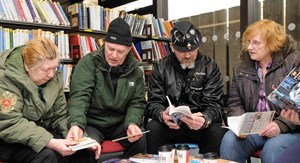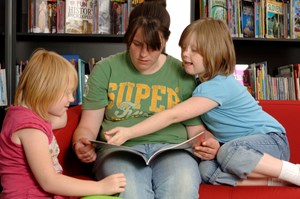The development of this course was sponsored by crime writer Ann Cleeves, who is passionate about the power of reading for pleasure to support our well-being. It is designed to help library staff who want to take on the role of directly engaging with individual readers and groups facing life’s challenges. It will give you the confidence to talk positively with people about their reading lives, including those who don’t read books and those who haven’t read in a long time.
The course is structured into two modules, each ending with a practical task. In Module One, you will explore the role reading can play in well-being and use practical approaches to engage readers in conversations about their reading. You will learn how to listen to different needs and offer meaningful reading connections. You will practise talking about reading with both those who consider themselves readers and those who don’t.
In Module Two, you will research and build the resources you need, exploring different formats to create a flexible capsule collection. This collection will help you promote reading for well-being in your library and provide ideas and experience for your future work in this role.
Your Mentor will provide detailed feedback and support on your tasks. Their role is to use their experience to challenge your thinking and help you adapt the course content to your workplace and role.
I have absolutely loved this course and everything I have gained from it has been so valuable. Thank you for the brilliant feedback. I learned a lot from my mentor and I would feel a lot less confident, even on completing the course, if I hadn’t had their guidance and suggestions.
Georgia Timmins Gateshead Libraries UK
I have really enjoyed the experience of the Reading for Wellbeing course – thank you so much for your feedback and encouragement! I’m sure the practice will inform our projects, especially in terms of how we prepare to engage with a wide audience of people from different backgrounds/situations/issues and encourage them to read without making them feel intimidated.
Lola Miller The Queen’s Reading Room UK
I found the clear language and explanations in the course very helpful and I enjoyed the activities relating to my own personal reading. In Module 2 – the activities on book covers and the guidance on feelgood books for the final task were stand out. Working with my mentor was fabulous – thank you for all the great feedback.
Holly Parkinson Hartlepool libraries UK
The personal feedback on this course is very in-depth and has provoked a lot of thought about how to approach each task.
Chris Wilcock Newcastle Libraries UK
The reflective nature of the information was really thought-provoking and the case studies were great – they really got me thinking about applying the knowledge. I found having discussions with my mentor really helpful and it made it a more personal experience.
Helen Parker Newcastle Libraries UK
Thinking about age and genre signifiers in book covers was interesting. I hadn't thought much about age signifiers for adult books except for the difference between adult and YA or children's books so this gave me a lot to think about. Having a personal mentor made me think more deeply about the content of the course. Thank you very much for everything.
Jen Szandrowska Gateshead Libraries UK
The experience of being able to have your [book collections] critically evaluated is of course slightly nerve-wracking but in a way that makes you take the time to actually think about the selection. Many thanks for championing the importance of reading for wellbeing. It is something that I feel confident in using within my work at the library now.
Paul Swift Otago University Library NZ

| Welcome from Ann Cleeves | |
| Welcome from your course mentors | |
| How the course works |

| Why reading | |
| What is a reader? | |
| Your own reading | |
| Love it or Loathe it 1 | |
| Love it or Loathe it 2 | |
| The reading experience | |
| People who don’t do books | |
| Engaging with parents through their children | |
| Sharing and enjoying bedtime stories | |
| Listening skills | |
| Finding connections | |
| Explaining your role | |
| Keeping your reading focus | |
| Becoming a reading champion | |
| Discussion with your Mentor | |
| Task One: Engaging with people | |
| Optional extra 1: Evidence of impact of reading on wellbeing | |
| Optional extra 2: Working with families with under-5s | |
| 2a: Talking about books with families with 0-3s | |
| 2b: Choosing with 3-5s | |
| 2c: A group session with families |

| Thinking differently | |
| Choosing a book by its cover | |
| Cover clues in adult books | |
| Cover clues in children’s books | |
| Using different formats | |
| Graphics for adults | |
| Graphics and comics for children | |
| Age appeal | |
| YA books | |
| Quick reads | |
| Poems, jokes and fun facts | |
| Reading out loud | |
| Range and variety | |
| Creating a welcoming space | |
| Introducing the library | |
| Running a drop-in session | |
| Running a group session | |
| Befriending individual readers | |
| Books to cheer you up | |
| Task Two | |
| Building your grid | |
| Discussion with your Mentor | |
| Learning review | |
| Optional extra | |
| Optional extra 2 | |
| Book grid 1 | |
| Book grid 2 | |
| Book grid 3 | |
| More Opening the Book courses | |
| Credits |
 Prices displayed in CAD
Prices displayed in CAD
